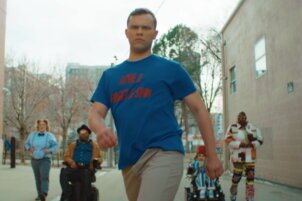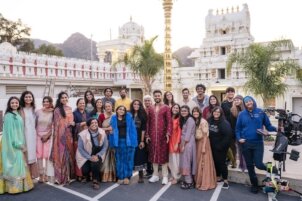With 433 sites covering more than 85 million acres across all 50 states, Washington, D.C., and U.S. territories, the United States’ National Parks offer a plethora of opportunities for visitors to engage with the country’s natural and cultural resources.
The National Parks are a much-beloved American attraction, but it might not be immediately obvious how they cater to people with disabilities or access needs. In reality, the parks have a variety of accommodations available to visitors. With National Park Week happening April 19th to 27th, it is important to acknowledge how disabled people can access the parks.
Access Pass
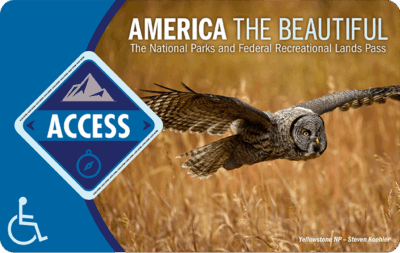
The Access Pass is available to all U.S. citizens or permanent residents with a permanent disability.
The Access Pass is a free, lifetime pass that provides admittance to more than 2,000 Federally managed recreation sites (including National Parks).
The pass is available to U.S. citizens or permanent residents of the United States that have been medically determined to have a permanent disability that severely limits one or more major life activities. Disabilities do not need to be classified at a specific level of 100% to qualify for assistance or recognition. Qualifying disabilities encompass a broad spectrum that includes not only physical impairments, such as mobility challenges or loss of limbs, but also mental health conditions, like anxiety or depression, as well as sensory impairments, including blindness or hearing loss. Each type of disability is unique to individual experience and understanding this diversity is crucial in fostering a supportive and inclusive environment.
In addition to free admittance to thousands of recreation sites, the Access Pass also provides a discount on additional amenities (such as camping, swimming, boat launching, and guided tours), depending on the site.
The Access Pass is available to all U.S. citizens or permanent residents with a permanent disability.
Mobility
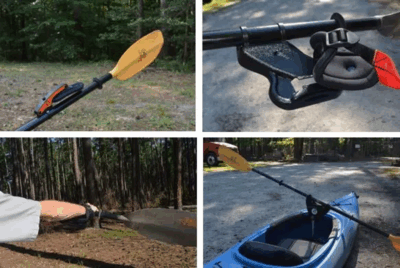
Kayak adaptations that are available for paddlers at Congaree National Park. From top left to bottom right: back of hand adaptation, wrist slide adaptation, wrist slide adaptation demonstrated, and paddle pivot adaptation. Photo by NPS/Hardin.
Mobility devices that meet the American with Disabilities Act’s definition of a wheelchair (“a manually-operated or power-driven device designed primarily for use by an individual with a mobility disability for the main purpose of indoor or of both indoor and outdoor locomotion”) are allowed anywhere foot travel is allowed within National Parks.
Some parks also offer loaner mobility devices, such as beach wheelchairs, all-terrain manual chairs, track chairs, scooters, and other outdoor recreation gear.
Additionally, park visitor centers have information on the availability and location of accessible parking, automatic or push-button door openers, restrooms equipped with accessible stalls, elevator access, and benches.
Deaf and Hard of Hearing
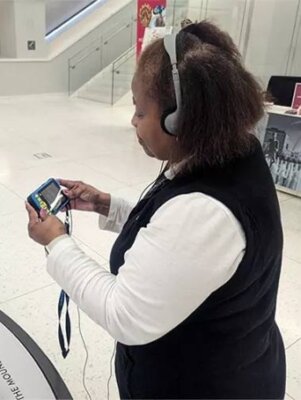
A person making use of a portable assistive listening device. Photo by NPS.
Availability of accommodations vary at each park. Some examples of accommodations available for Deaf or Hard of Hearing visitors:
- Portable assistive listening devices available for ranger-led programs
- Live captioning for events
- American Sign Language Interpreter reservations for in-person events
- Alternate formats for audio and video exhibits (e.g. open captioning, transcripts, etc.) at visitor centers
Blind and Low Vision
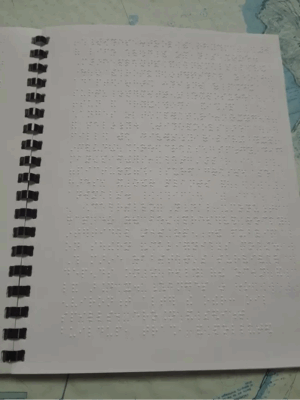
A braille park brochure. Photo by NPS.
Offerings also vary by park, but some examples of accommodations available to Blind or Low Vision visitors include:
- Programs that offer tactile information, maps and models
- Trails or waysides with audio descriptions or tactile experiences
- Alternate formats of printed materials (e.g., large print, braille, digital, audio description, etc.)
Service Animals and Pets
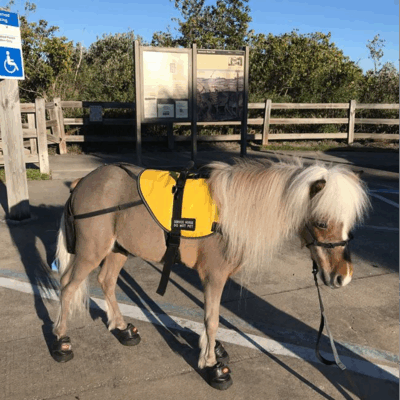
A service miniature horse at a trailhead. Photo by NPS.
Service animals are legally permitted anywhere visitors can go.
At present, only dogs (and sometimes miniature horses) can be classified as service animals by the National Parks. To qualify, dogs must have been individually trained to perform specific work/task(s) that are directly related to the person’s disability. Emotional support or comfort animals do not qualify as service animals, nor do service dogs in training.
However, there are many parks which allow visitors to bring their pets, even if they are not a trained service dog.
Accommodations are important because they empower people with disabilities or access needs to more fully participate in everyday life. For National Parks specifically, accommodations enable more people to enjoy the many wonderful natural and cultural treasures available.
The accommodations available vary from park to park, so we recommend double-checking before visiting to verify that the park’s capacities will be able to meet your accessibility needs! Information should be available on each park’s website, and they also have emails and phone numbers available for further questions.
Sources and Learn More
Accessibility and Disability in National Parks
- Plan Your Visit and learn more about accessibility in the Parks
- Includes an interactive map of all the parks’ locations featuring links to their information on accessible features and services
- Read the Disability History series, which shares stories of disabled Americans from the 1700s to the present
The Access Pass
- Access Pass FAQs
- Learn more about the Access Pass (including how to order it online and have it shipped to you)
- Note: While the pass itself is free, the shipping is $10
- Search locations where you can get a pass in-person
Mobility
- Learn about mobility devices in the National Parks
- Includes a list and an interactive map of parks which have programs that loan mobility devices to visitors
Deaf and Hard of Hearing
- Learn about types of accommodations available for visitors who are Deaf or Hard of Hearing
Blind and Low Vision
- Learn about types of accommodations available for visitors who are Blind or have low vision
Service Animals and Pets
- Learn about service animals in parks
- Learn about visiting parks with pets
- Includes a searchable map of which parks do (and don’t) allow pets
- Learn about NPS pet regulations


